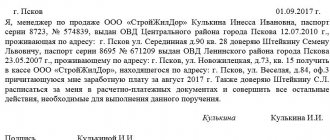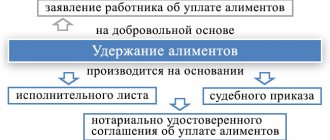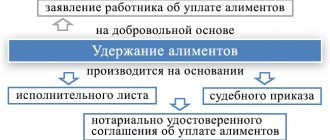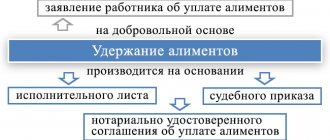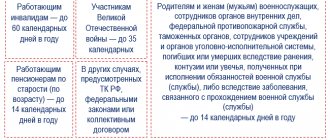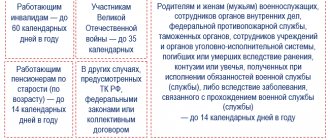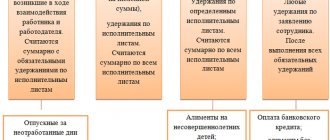Is it possible to defer payment of wages?
The company has the right to determine the dates of payment of wages to employees by internal regulations or employment contracts.
Since October 3, 2016, another condition has appeared - it is unacceptable to pay wages later than 15 calendar days from the end of the month for which they were accrued (Article 136 of the Labor Code of the Russian Federation). In the course of business activities, the employer may decide to change the timing of payment of wages (Article 22 of the Labor Code of the Russian Federation), make changes to employment contracts and local regulations. All this happens only in agreement with employees (Article 72 of the Labor Code of the Russian Federation), for which additional agreements are concluded with them.
Both when initially determining the terms of an employment contract and when making changes to it, it is necessary to take into account an important nuance: the determined conditions of remuneration cannot be worse than those established by labor legislation (Article 135 of the Labor Code of the Russian Federation).
Until October 2021, the requirements of the law were fully satisfied, for example, the following payment terms:
- 1st day of the month - advance payment for the previous month;
- On the 16th - payment of wages for last month.
However, from the fourth quarter of 2021 this is unacceptable.
How can employees protect their interests? Official employment!
The rights and interests of officially employed citizens are protected at the legislative level; accordingly, any violations by the employer, primarily related to timely payment of wages, are considered by state law enforcement agencies and in court. In turn, employees working without an employment contract cannot count on legally guaranteed wages and compensation payments in case of violation of salary payment deadlines. Employers who pay wages “in an envelope” try to avoid paying taxes and insurance contributions, avoiding interaction with the state, and, thus, not providing their employees with any guarantees for the protection of legal rights and interests.
In what cases must an employer pay compensation for delayed wages?
If the employer does not pay employees wages on time, he will have to pay monetary compensation according to the rules enshrined in Art.
236 Labor Code of the Russian Federation. From October 3, 2021, monetary compensation for the delay is paid in the amount of 1/150 of the key rate of the Central Bank of the Russian Federation in force during the delay period. Compensation is accrued from the next day after the “salary” to the day when the money is actually issued. If on the day of payment of wages the amount is not paid in full, then compensation is accrued for the balance not received on time. This procedure is established by Part 1 of Art. 236 Labor Code of the Russian Federation, clause 2 of Art. 2, Art. 4 of the Federal Law of July 3, 2016 No. 272-FZ.
The amount of monetary compensation may be increased by a collective agreement, employment contract or local regulation. Compensation must be paid regardless of whether the employer is at fault for the delay in wages. Such conclusions can be drawn from Part 2 of Art. 236 Labor Code of the Russian Federation.
Where to complain if you were not paid upon dismissal
If you decide to quit, in accordance with Article 84 of the Labor Code of the Russian Federation, the employer is obliged to make payments on the day of dismissal. At the same time, he must pay wages for the entire period of work. If upon dismissal the employer does not pay the salary, it is necessary to follow the same algorithm as when collecting wage arrears. The first thing you need to do is send a written complaint to the director of the enterprise. If the funds are not reimbursed within ten days, you must complain about the employer to Rostrud or the prosecutor's office. After this, if you are not paid upon dismissal, you need to complain to the court.
It is worth noting that there are controversial situations. For example, in the event of a shortage or in the event of return of workwear in improper condition, the employer has the right to deduct the amount of damage from the salary. The situation also becomes more complicated when the employee works unofficially. In this case, the complaint about non-payment of wages must be supported by documents confirming work at this enterprise.
How is compensation for delay calculated?
Let's look at an example of how to determine the amount of compensation for delayed payment of wages. Suppose Smetannik LLC has the following salary payment deadlines:
- for the first half of the month - on the 23rd day of the current month;
- for the second half of the month - on the 8th day of the next month.
Salaries for the second half of October 2021 were accrued in the amount of 20,000 rubles, but were paid only on November 22, 2016.
The duration of the delay from 09.11.2016 to 22.11.2016 was 14 days. The key rate of the Bank of Russia, which was in effect during the period of overdue payments, was 10%.
Compensation is calculated in the amount of 17,400 rubles (20,000 – (20,000 x 13%)).
The amount of compensation will be 162.40 rubles (17,400 x 10% / 150 x 14).
Salary payment deadlines in 2021 and 2021
In accordance with Art. 136 of the Labor Code of the Russian Federation, salaries are paid no less than every half month and no later than 15 calendar days from the end of the period for which they were accrued. Specific deadlines are not established in the legislation: they must be specified in the employer’s local regulations: collective agreement, employment contract, internal labor regulations. Taking into account the requirements of the code, you need to pay:
- salary for the first half of the month - no later than the 30th (31st) day of the current month;
- for the second half of the month - no later than the 15th day of the next month.
Paying salaries every half month and twice a month is not the same thing.
For example, by paying wages on the 5th and 18th, you pay wages twice a month, but violate the permissible interval between payments - 15 days. Correct option: salary for the first half of the month is paid on the 25th, and for the second half of the month - on the 10th of the next month. In the table we have collected the ratio of advance and salary dates.
| Advance this month | Salary next month |
| 16 | 1 |
| 17 | 2 |
| 18 | 3 |
| 19 | 4 |
| 20 | 5 |
| 21 | 6 |
| 22 | 7 |
| 23 | 8 |
| 24 | 9 |
| 25 | 10 |
| 26 | 11 |
| 27 | 12 |
| 28 | 13 |
| 29 | 14 |
| 30 | 15 |
| 31 | 16 |
If an organization has separate divisions or a large staff of employees, then in each of the divisions or departments you can approve different salary payment dates. The main thing is not to violate the interval of 15 days.
It is unacceptable to set a salary payment period instead of indicating the exact day (letter of the Ministry of Labor of the Russian Federation dated November 28, 2013 No. 14-2-242). The wording “salaries are paid no later than the 10th and 25th of each month” is similarly unsafe.
If the salary payment date falls on a weekend, it is paid on the day preceding the weekend. In other cases, it is impossible to pay wages before the due date. Although the rights of workers are not violated, the labor inspectorate may, with a small probability, impose a fine for this. The problem is that a violation of the 15-day period may occur, and in addition, local regulations will not correspond to the actual procedures of the company.
The rules of Article 136 of the Labor Code are mandatory for everyone. They cannot be violated even at the written request of an employee who wants to receive a salary once a month in full.
The Labor Code establishes the obligation to pay wages at least every half month. This means that you cannot pay less often, but you can please your employees with weekly or even daily payments without restrictions. The main thing is to consolidate this in local documents: internal regulations, collective or employment agreement.
In this case, it is not necessary to fix the salary payment period in the employment contract. It is enough to fix the payment schedule in the internal regulations, which each employee is familiar with upon signature. This was stated in the letter of Rostrud dated March 6, 2012 No. PG/1004-6-1.
Salaries can be paid by transfer to a bank card or in cash. When paying in cash, the employee may not collect the salary on time. For example, due to illness. In this case, it must be deposited. Therefore, the non-cash method of paying salaries is becoming increasingly widespread.
Calculate salaries and fill out personnel documents in Kontur.Accounting. Accounting, taxes, salaries, reporting sent via the Internet in one service. Get free access for 14 days
What consequences await the organization if compensation is not paid?
Let us repeat, payment of compensation for delayed wages is an obligation provided for by the Labor Code.
However, the Code of Administrative Offenses of the Russian Federation does not clearly establish liability for untimely payment of compensation in the event of delayed wages. However, general liability is provided for violations in the field of remuneration. So, for non-compliance with the norms of the Labor Code of the Russian Federation, the labor inspector can fine:
- the head of the organization - in the amount of 1 to 5 thousand rubles;
- the organization itself - in the amount of 30 to 50 thousand rubles.
These amounts do not seem so significant if the fines are imposed once. Practice shows that one-time delays in salary payments are extremely rare, and if a company does commit such violations, it is often with enviable consistency.
Where and when to complain about an employer for non-payment of wages
The employee has the right not to wait for a voluntary transfer of wages from the company, but to immediately file a complaint with the regulatory authorities or file a claim in court. A labor dispute claim is submitted to the labor inspectorate, prosecutor's office or court.
The labor inspectorate, based on an employee’s application or on behalf of the prosecutor’s office, conducts an extraordinary inspection of the employer and forces him to fulfill his obligations to pay wages. In addition, the company will be subject to a significant fine for violating labor laws:
- from 30,000 to 50,000 rub. — on the organization;
- from 10,000 to 20,000 rub. - to an official.
The employee has one year from the date of non-transfer of wages to file a claim in court (Part 2 of Article 392 of the Labor Code of the Russian Federation).
What to do if the company does not have enough money to pay salaries and compensation?
The well-known advice of the Prime Minister will not work in such a situation.
The law does not relieve the employer from the obligation to pay wages to the employee even if business activities are temporarily suspended due to financial difficulties. If employees do not go to work due to non-payment, using their right enshrined in Part 1 of Art. 157 of the Labor Code of the Russian Federation, then according to the law (Part 3 of Article 72.2 of the Labor Code of the Russian Federation), this situation is recognized as downtime. And downtime is paid in an amount not lower than 2/3 of the average salary of workers. Compensation will also have to be paid.
Unlock access to the private part of Clerk with a Premium subscription. Get hundreds of webinars and online courses, unlimited consultations and other proprietary content for accountants.
Hurry up to subscribe with a 20% discount until October 15, 2021. Read more about “Premium” here.
Where to go if wages are not paid
The first action of an employee who is officially employed, if wages are not paid on time, is to send a letter of complaint to the employer.
It must be registered with notification of receipt by the addressee. The director of the enterprise must give you an official response to the complaint. If the company did not respond or the organization refused to pay wages in a response letter, the next step is to contact Rostrud. You need to fill out an application by visiting the labor inspection office or sending an email to the official mail of the government agency. The application must indicate in detail all the facts of violation of the employee’s rights. After this, Rostrud will inspect the enterprise and oblige you to pay wages.
If the employer does not pay wages, you should file a complaint with the prosecutor's office. You need to come to the nearest branch and fill out an application in any form with the employee on duty. It is recommended to contact law enforcement agencies if wages have not been paid for about two months, and complaints to management and the labor inspectorate have not yielded results.
Also, if your salary is delayed, you can go to court. This should be done if complaints to the above government bodies did not help. All previous appeals will serve as evidence that the employer is not fulfilling his duties and violating the rights of the employee. The claim must be filed in the district court at the location of the company's head office.
The actions of an employee who is unofficially employed do not differ from the actions of an employee with official employment. He also needs to first send a written complaint to the employer, and if this does not produce results, file a complaint with Rostrud, the prosecutor's office, or go to court. The only difference is that when applying to government agencies, the employee must prove the fact of employment. Evidence may include:
- correspondence with the employer, which is notarized;
- any documents of the enterprise in which the employee’s name appears;
- statements that indicate the amount of wages, as well as the signature of the director and the seal of the company;
- envelopes containing the employee’s name and salary;
- witness's testimonies.
If wages are not paid on time, and the delay is more than 15 days, the employee may suspend his work. In this case, written notice must be given to the director of the company. Work can also be resumed only upon written notification from the employer of readiness to pay the debt.
Responsibility for violation of terms of payment of advance payment and salary
Late payment
Article 236 of the Labor Code of the Russian Federation provides for financial liability for non-payment of wages on time. Interest is accrued daily on the amount that has been withheld. From October 3, 2021, their size was increased to 1/150 of the discount rate of the Central Bank of the Russian Federation per day, including the day after the established payment deadline and the day of actual settlement. This is the minimum amount of compensation, but the employer can increase it on its own initiative. Compensation is paid along with payment of the delayed amount.
Compensation is awarded regardless of whether the employer is at fault for violating payment deadlines.
In addition to financial liability, there is administrative liability for late wages - a warning or a fine.
| Who will be fined | Primary penalty | Repeated fine |
| Executive | 1,000 - 5,000 rubles | 10,000 - 20,000 rubles |
| Guilty IP | 1,000 - 5,000 rubles | 10,000 - 20,000 rubles |
| Guilty legal entity | 30,000 - 50,000 rubles | 50,000 - 70,000 rubles |
A repeated violation is considered non-payment of wages within a year from the date of entry into force of the decision on the first fine. In addition, the official may be subject to disqualification for a period of 1 to 3 years. All fines are listed in Art. 5.27 Code of Administrative Offenses of the Russian Federation.
An employee has every right to boycott a negligent employer. Article 142 of the Labor Code of the Russian Federation, if wages are delayed by more than 15 days, the employee may stop performing his job duties, for example, stop going to work or idle at the workplace. The only condition is that the employee must notify the employer about this in writing.
You must return to work no later than the next working day after the employer informs you in writing that it is ready to pay wages on the day the employee returns.
Not every employee can afford such behavior. There are situations when suspension of work is not allowed:
- You cannot stop working during periods of emergency;
- employees of the Armed Forces of the Russian Federation, civil servants, employees of defense enterprises, and law enforcement agencies cannot stop fulfilling their duties;
- you cannot refuse to work in organizations serving particularly hazardous types of production;
- Employees whose activities are related to ensuring the livelihoods of the population (energy supply, heating, water supply, etc.) cannot stop working.
According to Art. 142 of the Labor Code of the Russian Federation, during the suspension of work the employee retains his average earnings. Therefore, the manager must also pay the worker for downtime.
Calculate salaries and fill out personnel documents in Kontur.Accounting. Accounting, taxes, salaries, reporting sent via the Internet in one service. Get free access for 14 days
Payment ahead of schedule
If an employer unreasonably pays wages ahead of schedule, then he violates Article 142 of the Labor Code of the Russian Federation. This can be assessed as a violation of labor legislation and punished in accordance with Part 1 of Art. 5.27 of the Labor Code of the Russian Federation, similar to salary delays.
| Who will be fined | Primary penalty | Repeated fine |
| Executive | 1,000 - 5,000 rubles | 10,000 - 20,000 rubles |
| Guilty IP | 1,000 - 5,000 rubles | 10,000 - 20,000 rubles |
| Guilty legal entity | 30,000 - 50,000 rubles | 50,000 - 70,000 rubles |
The likelihood of being held accountable for such a violation is extremely low, because no one’s rights are violated. If your employees don't hate you, they certainly won't complain. But in order to avoid violating the provisions of the Labor Code of the Russian Federation, we recommend that salaries be transferred strictly on the dates established by local regulations.
It is convenient to calculate your salary in the online service Kontur.Accounting. The system will automatically process postings based on salary, other charges and deductions, prepare payment slips, and remind you of payment deadlines. It’s easy to keep records, pay taxes, and report online. All newcomers work in Accounting for free for 14 days.
Try for free
What should an employee do if his salary is delayed?
If the employer has delayed wages for 15 days or more, the employee has the right, by notifying the employer in writing, to suspend work for the entire period until the delayed amount is paid. An application for suspension of work can be sent by registered mail with notification.
The employer is obliged to pay for the period of suspension of work based on the employee’s average earnings during the period of downtime. But the next day after payment of wages, the employee must begin work.
If the employer, despite the measures taken, still does not pay wages, the employee has the right to contact the labor inspectorate.
The appeal must indicate the employee's full name, postal address, telephone number, period of non-payment of money and the total amount of debt, attaching a copy of the employment contract and evidence of non-payment of wages. The following can be used as evidence:
- salary slips;
- a copy of the employment order;
- a copy of the work book where the employment record is entered;
- a dictaphone recording of a conversation with the employer about the reasons for non-payment of wages;
- witness statements.
The labor inspectorate will consider the application within 30 days. Based on the results of the inspection, the employer will be issued an order to pay wages to employees, as well as accrue interest.
From December 13, 2021, labor inspectors can make decisions on the forced recovery of actually unpaid wages from the employer out of court (Federal Laws of December 2, 2019 No. 393-FZ, of December 2, 2021 No. 402-FZ).
If the company does not comply with the instructions of the Trudoviks on time, they will make a decision, which is an executive document. Within three working days after the decision is made, it will be sent to the employer by registered mail with notification or in the form of an electronic document. The company will have 10 days to challenge the decision in court.
If the decision of the labor inspectorate is not implemented and the appeal period expires, an electronic copy of the decision will be transferred to the bailiff service.
From the day the employer receives the bailiffs' order to initiate enforcement proceedings, he will have 5 days to voluntarily pay off the debts. Otherwise, the money will be forcibly written off from his account.

